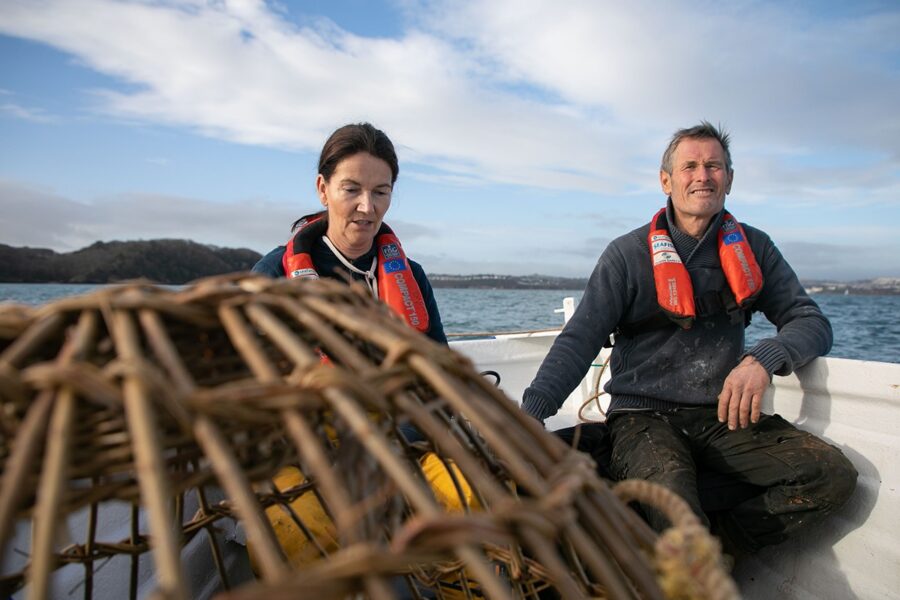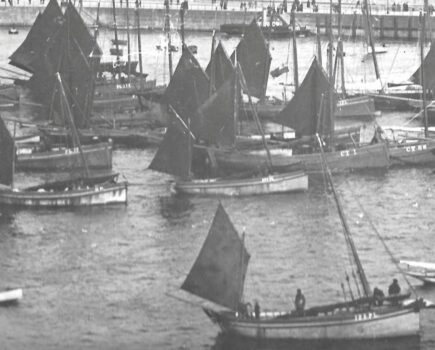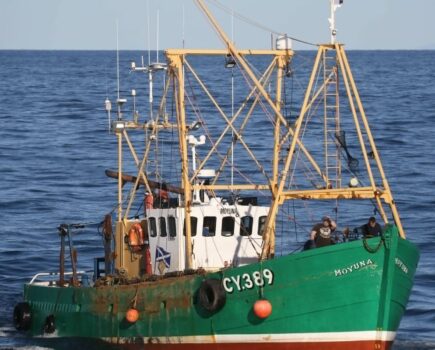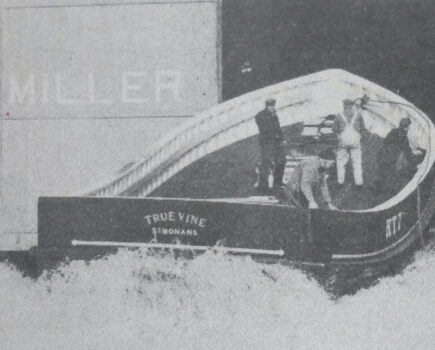With the launch of a third call for applications, Fishing News is taking a closer look at some of the projects already supported by the UK Seafood Innovation Fund (SIF). This week’s featured project is a South Devon trial aiming to boost the sustainability of the inshore fleet
Two Brothers Fishing Ltd based in Brixham and fishing off the South Devon coast for decades, was awarded funding through the Seafood Innovation Fund programme to undertake a three-month project during the winter of 2020/21.
The initial study successfully demonstrated that electric- powered vessels are a viable option for small-scale fishers, establishing that it is possible to reach fishing grounds and work those grounds with a small solar-powered electric outboard and a spare battery.
Willow lobster pots and other eco-friendly gear were also used, helping to identify and quantify any value added to the fish caught using this ‘dual system’ of eco fuel and eco gear.
The initial feasibility study earlier this year explored the practicality of being able to transit to fishing/potting grounds in a small day-boat with an electric outboard motor. Additional data collection and research was carried out to evaluate the market opportunities for more ‘environmentally friendly’ fish.
The project found that there is a high level of interest from consumers for more sustainably caught species, which they are prepared to pay a higher price for. This may help to relieve pressure on fish stocks, as a higher product premium reduces the volume and number of fish that need to be caught and sold in order to reach the same income.
The primary motivations behind the research came from the rising costs of engine fuel, alongside a developing market for sustainably caught fish. Environmentally friendly alternatives that are both practical and safe could provide a workable solution for the inshore fleet.
The second phase of the study is now underway with a scale-up project to obtain Maritime and Coastguard Agency (MCA) approval for an electric fishing boat build. The designs include a twin-battery system that will enable sufficient battery for a full day of static-gear fishing off the South Devon coast.
Darren Ready, who leads the project and has decades of experience in both marine engineering and fishing (with methods ranging from trawling to all types of static gear), says: “The cost of fuel for trawling is at an all-time high, currently standing at around 62p per litre. This has a huge impact on the viability of our fishing operation, particularly where fish is scarce – and the price of fish is not high.
“Fishing is an industry that continually requires diversification and adapting to change. We see the new project as a catalyst for change to explore new avenues and test the consumer appetite for more eco-caught species.”
The project is set to evolve over the winter as the team further develop gear that facilitates more sustainable fishing, alongside the electric boat build. Sarah Ready will also continue with her withy pot-making over the coming months.
She says: “The project has an 18-month duration, and it is expected that the initiative will evolve during this timeframe, with new partnerships emerging through an ongoing dialogue as the sustainable fishing project is underway.
“It is anticipated that the transparency of catch will ignite enthusiasm into more direct- selling markets, particularly as it is clear that there is an appetite from many to pay a higher premium for sustainably caught fish/shellfish that has provenance.
“Consumers are interested in buying into an experience, not just purchasing a piece of fish, and we have found an overwhelming enthusiasm for end consumers to have information on where the fish was caught, and by what method.
“We intend to engage through social media to harness this enthusiasm and grow with this across many social media platforms. Engagement is the key with the customer to raise awareness.”
The project utilises the skills of Darren and Sarah’s young fisherman son, Daniel Ready, who has a good grip on new technology, and is currently studying naval architecture and boat design. Daniel currently fishes on the Resolute BM 33 out of Brixham.
He explains: “It is very difficult for young entrants to the fishing industry to be able to afford a first boat and licence. For many, unless there is fishing family support, this is out of the question.
“It may well be that due to the lower kW (kilowatt) on electric engines, the licences will be cheaper than for the equivalent powered boat that is diesel- based. I am interested in calculating the return on the money spent through a possible higher value through the catching of fish with green energy.”
An exciting element of the Seafood Innovation Fund project will be research into the possibility of a higher-value catch for inshore, eco-caught fish, both locally and nationally, compared with the other vessel used by Two Brothers Fishing Ltd, which utilises otter trawling methods.
If you have a question for the project team or would like to find out more, you can contact them via email at: twobrothersbrixham@gmail.com.
How to apply
The third UK Seafood Innovation Fund (SIF) call is open for feasibility studies (maximum five months, £50,000 funding). SIF is administered by the Centre for Environment, Fisheries and Aquaculture Science (CEFAS) on behalf of the Department for Environment, Food and Rural Affairs (DEFRA).
Organisations of any size or type can apply. Collaborative partnerships are encouraged, and project teams should include all relevant expertise to deliver a successful project outcome. Stakeholders set to benefit from the proposed solution should be included in the wider team, whether these are retailers, regulatory bodies, or those working directly in the seafood industries.
Feasibility studies with a successful outcome will have the opportunity to compete for an extended research and development phase to fully develop their idea.
So if you have an innovative idea that has the potential to deliver something that has never been done before and solve some of the biggest challenges to the sector, here’s how to apply:
- Read the FAQs here.
- Register at the DEFRA procurement portal here.
- Search for the opportunity page: CEFAS21-90 Seafood Innovation Fund
- Download and read the call documentation pack
- Complete your application form (and obtain the relevant supporting information)
- Submit your completed application before midday on 7 January, 2022.
Please note: the deadline for submission of an Expression of Interest to obtain feedback has now passed, but this does not affect your eligibility to apply.
This story was taken from the latest issue of Fishing News. For more up-to-date and in-depth reports on the UK and Irish commercial fishing sector, subscribe to Fishing News here or buy the latest single issue for just £3.30 here. Main image credit: Poppy Jakes Photography









